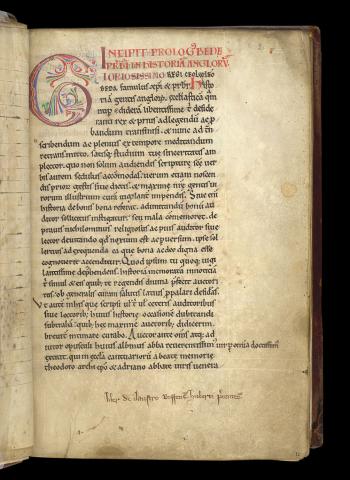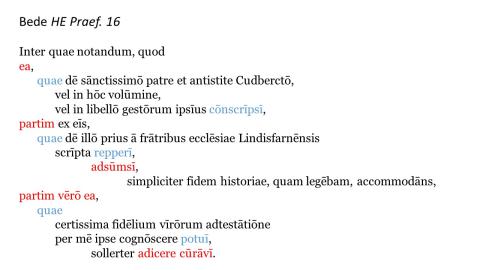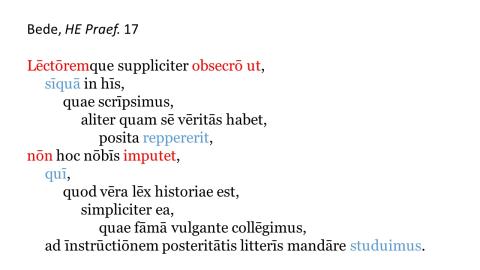GLŌRIŌSISSIMŌ RĒGĪ CEOLVULFŌ BAEDA FAMULUS CHRĪSTĪ ET PRESBYTER
Historiam gentis Anglōrum ecclēsiasticam, quam nūper ēdideram, libentissimē tibi dēsīderantī, rēx, et prius ad legendum ac probandum trānsmīsī, et nunc ad trānscrībendum ac plēnius ex tempore meditandum retrānsmittō; satisque studium tuae sincēritātis amplector, quō nōn sōlum audiendīs scrīptūrae sānctae verbīs aurem sēdulus accommodās, vērum etiam nōscendīs priōrum gestīs sīve dictīs—et maximē nostrae gentis virōrum inlūstrium—cūram vigilanter impendis. [2] Sīve enim historia dē bonīs bona referat, ad imitandum bonum audītor sollicitus īnstīgātur; seu mala commemoret dē prāvīs, nihilōminus religiōsus ac pius audītor sīve lēctor dēvītandō quod noxium est ac perversum, ipse sollertius ad exsequenda ea quae bona ac Deō digna esse cognōverit, accenditur. [3] Quod ipsum tū quoque vigilantissimē dēprehendēns, historiam memorātam in nōtitiam tibi simul et eīs, quibus tē regendīs dīvīna praefēcit auctōritās, ob generālis cūram salūtis lātius prōpalārī dēsīderās. [4] Vt autem in hīs quae scrīpsī vel tibi vel cēterīs audītōribus sīve lēctōribus huius historiae occāsiōnem dubitandī subtraham, quibus haec maximē auctōribus didicerim, breviter intimāre cūrābō.
[5] Auctor ante omnēs atque adiūtor opusculī huius Albīnus, abba reverentissimus, vir per omnia doctissimus, extitit; quī in ecclēsiā Cantuāriōrum ā beātae memoriae Theodōrō archiepiscopō et Hadriānō abbāte, virīs venerābilibus atque ērudītissimīs, īnstitūtus dīligenter omnia, quae in ipsā Cantuāriōrum prōvinciā vel etiam in contiguīs eīdem regiōnibus ā discipulīs beātī pāpae Gregōriī gesta fuēre, vel monimentīs litterārum, vel seniōrum trāditiōne cognōverat; et ea mihi dē hīs, quae memoriā digna vidēbantur, per religiōsum Lundoniēnsis ecclesiae presbyterum Nothelmum, sīve litterīs mandāta sīve ipsīus Nothelmī vīvā vōce referenda, trānsmīsit. [6] Quī vidēlicet Nothelmus posteā Rōmam veniēns, nōnnūllās ibi beātī Gregōriī pāpae simul et aliōrum pontificum epistulās, perscrūtātō eiusdem sānctae ecclēsiae Rōmānae scrīniō, permissū eius, quī nunc ipsī ecclēsiae praeest Gregōriī pontificis, invēnit, reversusque nōbīs nostrae historiae īnserendās cum cōnsiliō praefātī Albinī reverentissimī patris adtulit.
[7] Ā prīncipiō itaque volūminis huius usque ad tempus, quō gēns Anglōrum fidem Chrīstī percēpit, ex priōrum maximē scrīptīs hinc inde collēctīs ea quae prōmerēmus didicimus. [8] Exinde autem usque ad tempora praesentia, quae in ecclēsiā Cantuāriōrum per discipulōs beātī pāpae Gregōriī sīve successōrēs eōrum, vel sub quibus rēgibus gesta sint, memorātī abbātis Albinī industriā, Nothelmō ut dīximus perferente, cognōvimus. [9] Quī etiam prōvinciae Orientālium simul et Occidentālium Saxonum, nec nōn et Orientālium Anglōrum atque Nordanhymbrōrum, ā quibus praesulibus, vel quōrum tempore rēgum grātiam ēvangeliī percēperint, nōnnūllā mihi ex parte prōdidērunt. [10] Dēnique hortātū praecipuē ipsīus Albinī, ut hoc opus adgredī audērem, prōvocātus sum. [11] Sed et Danihel reverentissimus Occidentālium Saxonum episcopus, quī nunc usque superest, nōnnūlla mihi dē historiā ecclēsiasticā prōvinciae ipsīus, simul et proximā illī Austrālium Saxonum, nec nōn et Vectae īnsulae litterīs mandāta dēclārāvit. [12] Quāliter vērō per ministerium Ceddī et Ceaddā religiōsōrum Chrīstī sacerdōtum, vel prōvincia Merciōrum ad fidem Chrīstī, quam nōn nōverat, pervēnerit, vel prōvincia Orientālium Saxonum fidem, quam ōlim exsufflāverat, recuperāverit, quālis etiam ipsōrum patrum vīta vel obitus extiterit, dīligenter ā frātribus monastēriī, quod ab ipsīs conditum Laestingaeu cognōminātur, agnōvimus. [13] Porrō in prōvinciā Orientālium Anglōrum quae fuerint gesta ecclēsiastica, partim ex scrīptīs vel trāditiōne priōrum, partim reverentissimī abbātis Ēsī relātiōne comperimus. [14] At vērō in prōvinciā Lindissī quae sint gesta ergā fidem Chrīstī quaeve successiō sacerdōtālis extiterit, vel litterīs reverentissimī antistitis Cyniberctī vel aliōrum fidēlium virōrum vīva vōce didicimus. [15] Quae autem in Nordanhymbrōrum prōvinciā, ex quō tempore fidem Chrīstī percēpērunt, usque ad praesēns per dīversās regiōnēs in ecclēsiā sint ācta, nōn ūnō quōlibet auctōre, sed fidēlī innumerōrum testium, quī haec scīre vel meminisse poterant, adsertiōne cognōvī, exceptīs hīs, quae per mē ipsum nōsse poteram. [16] Inter quae notandum, quod ea, quae dē sānctissimō patre et antistite Cudberctō vel in hōc volūmine vel in libellō gestōrum ipsīus cōnscrīpsī, partim ex eīs, quae dē illō prius ā frātribus ecclēsiae Lindisfarnēnsis scrīpta repperī adsūmsī, simpliciter fidem historiae quam legēbam accommodāns, partim vērō ea quae certissima fidēlium vīrōrum adtestātiōne per mē ipse cognōscere potuī, sollerter adicere cūrāvī. [17] Lēctōremque suppliciter obsecrō, ut, sīquā in hīs quae scrīpsimus aliter quam sē vēritās habet posita reppererit, nōn hoc nōbīs imputet, quī, quod vēra lēx historiae est, simpliciter ea quae fāmā vulgante collēgimus ad īnstrūctiōnem posteritātis litterīs mandāre studuimus.
[18] Praetereā omnēs, ad quōs haec eadem historia pervenīre potuerit nostrae nātiōnis, legentēs sīve audientēs, suppliciter precor, ut prō meīs īnfirmitātibus et mentis et corporis apud supernam clēmentiam saepius intervenīre meminerint; et in suīs quīque prōvinciīs hanc mihi suae remūnerātiōnis vicem rependant, ut quī dē singulīs prōvinciīs sīve locīs sublīmiōribus, quae memorātū digna atque incolīs grāta crēdideram, dīligenter adnotāre cūrāvī, apud omnēs frūctum piae intercessiōnis inveniam.



